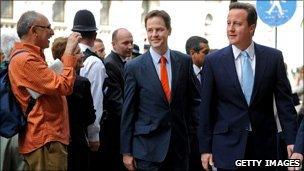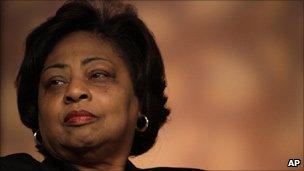Life's unfair? Do something! Or just get used to it...
- Published
The word "fair" has been jangling loudly in my ears recently.
Out there in the zeitgeist, the new coalition government in Britain can't use "fair" often enough. In America, liberal commentators are trying to reclaim the word from "fair and balanced" Fox News.
Meanwhile, at my house, my almost-five-year-old daughter has discovered its use.

A pure American sentiment: Life's unfair? Get used to it!
"I want an ice cream."
"No."
"That's not fair!!!"
Or: "I want to watch TV."
"Not now."
"Why?"
"Because I said so."
"That's not fair!!!!!!!!!"
The first time she complained, "That's not fair!", my response was immediate and required no thought.
"Life's not fair. Get used to it, baby."
The response surprised me a little, as soon as it passed my lips. I have lived in England for almost a quarter of a century and have become a cultural hybrid but here was pure American sentiment coming up from the depths of my subconscious.
Destructive change
"Fair" is one of those concepts that doesn't quite mean the same thing on either side of the Atlantic.
The difference in use of the word in Britain and the US is a more profound marker of how dissimilar the two peoples are than the old cliches about driving on the wrong side of the road, calling private schools "public schools", and the temperature at which beer is drunk.
Working through both strands of cultural DNA in my hybrid nature, I think I know why there is such a huge difference.
America is a profoundly unsettled place. Whether you buy into the notion of the creative destruction of the American brand of capitalism or put it down to the fact that it's a damn big place and easy to move around in, American society doesn't stay the same for very long.
Change - wanted or unwanted - comes from all directions and very often individuals find their lives overwhelmed through forces beyond their control.
In America, it won't do much good to sit weeping that "It's not fair!" when destructive change comes to your front door. You will get little sympathy.
When events crush you, you are expected to pack up your belongings, move somewhere else and start over. Is that cold, cruel and harsh? Tough, "Life's not fair!"
Britain is a much more settled society, nestled into a smaller geographical area.
When economic or social disruption comes there are not a lot of places for people to go, so, for a very long time - centuries - it has been necessary to emphasise "fairness" as a kind of social glue. A fair society is a tacit part of the British social contract.
Losers
The process by which the meaning of fair is arrived at is about the same on both sides of the Atlantic. It is analogous to the way 10-year-old boys make up rules for a ball game.

Public schoolboys Clegg and Cameron are updating the British idea of "fairness"
There is an intuitive knowledge of what the boundaries of the game should be. They are set at the point just before the contest would otherwise degenerate into anarchy.
But even here there is a difference. American schoolboys know that winning is the only thing and define fairness accordingly. Winners get to stay on court. Losers walk. That seems fair.
In Britain, for centuries the definition of fairness was devised by boys from public schools (in the British sense) - from places like Eton and Westminster.
For people who had, for the most part, inherited their positions of privilege, the outcome of the competition was not important. Playing the game well, not trying too hard to win, giving the other chap a chance, took precedence.
Over the last century, the working class, via the Labour Party, has forced its way into the caucus that defines fairness. It has brought a utilitarian strain to the discussion.
This led to the creation of the welfare state after World War II - which, 65 years later, remains the framework for a fair and just British society.
Unfair times
The degree to which British society adheres to its own idea of fair play is profound and politicians mess with it at their peril.
Former Prime Minister Margaret Thatcher tried to change Britons' idea of fairness to something closer to the American definition. She failed utterly.
Her plan for a flat rate poll tax in which the rich, middle class and the poor would pay the same local tax was denounced as "unfair" and led to mass demonstrations by people from all levels of society and ultimately her removal from office by her own party.
In any case, "fair" is having its moment in the political sun. Primarily because we live in manifestly "unfair" times.
The past three years have seen the economies in both countries contract violently because of shenanigans by financial speculators hiding behind the legitimacy of our banking institutions.
The banks were bailed out by taxpayers.
Subsequently both economies went into deep recession.
Now the banker/speculators are once again paying themselves massive bonuses. Meanwhile, the people who bailed them out live in a world of rising unemployment, and in Britain we have entered a new age of austerity.
No wonder the coalition government in Britain has made "fair" its watchword.
Even if its definition is wobbly.
Once again it is the public schoolboys who are updating the word's meaning. At his first joint news conference with Prime Minister David Cameron (Eton), following the creation of the coalition, Deputy Prime Minister Nick Clegg (Westminster), leader of the Liberal Democrat Party, tried to explain his definition of liberalism.
"Ensuring that everyone has the chance, no matter who they are and where they are from, to be the person they want to be. To live the life they want to live," he said.
"You can call it fairness. You can call it responsibility. You can call it liberalism. Whatever words you use the change it will make to your life is the same."
Fairness=Responsibility=Liberalism. It remains to be seen if something so woolly will take root in Britain.
Forced resignation
Meanwhile, in an America that seems to be at boiling point, the focus of discussion on the word "fair" is centred on yet another controversy fuelled by Fox News, the Rupert Murdoch-owned 24-hour news channel.

Shirley Sherrod's forced resignation has created a politican storm in America
Since its launch in 1996, the channel's motto has been "Fair and Balanced", the implication being that other sources of news, like the New York Times, CNN and the BBC are unfair and biased.
Fox News is led by Roger Ailes, who was a campaign consultant to Ronald Reagan among other Republicans. He has created a channel with hosts like Glenn Beck who, exactly a year ago, claimed that President Obama "has a deep-seated hatred of white people".
Under the banner of fairness, it has sought out examples of black racism. Most recently it aired footage of an African-American woman, Shirley Sherrod, an official in the Department of Agriculture, giving a speech to the National Association for the Advancement of Colored People.
She is seen saying she had denied a white farmer a government grant.
Turns out the footage, which first appeared on a conservative blog, was edited and her remarks taken out of context. Ms Sherrod actually was using the story of the farmer to tell of her struggle to overcome her own prejudices. In fact, she had approved the grant to the farmer.
The full footage of her speech only resurfaced after she had been forced to resign.
Fairness for all?
This has created a tempest in America over the the past week or two. Liberal columnists are trying to take back the word "fair".
E J Dionne in the Washington Post wrote: "The mainstream media and the Obama administration must stop cowering before a right wing that has persistently forced its propaganda to be accepted as news by convincing traditional journalists that 'fairness' requires treating extremist rants as 'one side of the story'."
Frank Rich in the New York Times, criticising Fox and the Obama White House for believing the story, wrote: "Meanwhile, the majority of Americans, who believe in fundamental fairness for all, grapple with the poisonous residue left behind by the many powerful people of all stripes who served as accessories to a hi-tech lynching."
I'm not sure I agree with Rich's claim that Americans want "fundamental fairness for all". I think history shows Americans want fundamental fairness for all who are just like them. For everyone else: if life is not fair, that's tough.
Michael Goldfarb, external is a journalist and broadcaster who has lived in London since 1985. Formerly with National Public Radio, he is now the London correspondent of globalpost.com, external.
- Published20 July 2010
- Published22 July 2010